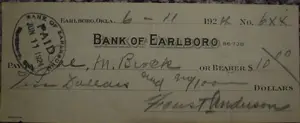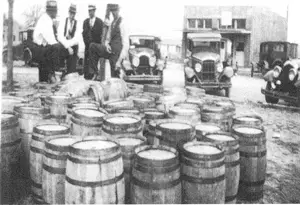| In 1892 as land was opened up for settlement,
200-300 people quickly clamed farms, then by legend, named the community
Tums, Boom-de-Ray, and finally Loftus: the coming of the Choctaw railroad
caused the town to move to the present site. it was officially declared
a town on June 12, 1895 and then named Earlsboro after a popular Black barber,
James Earls, who also dealt in whiskey. As it was only one-half mile from
Indian territory, it became wide open for saloons ect.
In 1926 a huge oil-field was discovered, first on the Ingram and later on
the Gypsy lease, this brought oil companies and people from all over and
the town grew to around 10,000 almost overnight. As the oil supply dwindled,
oil companies moved their families out leaving the water supply damaged
with salt water and oil field debris. During the boon the town voted Bonds,
built paved streets and sidewalks, and a modern sewer system: they were
unable to to pay off the debt and took bankruptcy. The bad water and the
debt Kept the town from growing and although listed as a "ghost"
town, it refused to die and is now steadily growing with good water, schools,
and location. There is still some oil there, but once again predominately
an agriculture and cattle community.Submitted by Joshua Gee
From the book: “ Oklahoma Place Names” 2nd Ed by George H. Shirk Univ of Oklahoma Press 1974
Page: 76 EARLSBORO. Formerly Loftis, In Pottawatomie County, 7 miles east of Tecumseh. The townsite plat named Earlsborough.
Post Office name changed to Earlsboro, June 12, 1895. Named for James Earls, popular local Negro barber. |

I came accost this check at a antique shop in my home town. I thought
this check was very interesting because for on thing Earlsboro is spelled
rong two times out three on this check. Earlboro no longer has a bank.
Pretty Boy Floyd robed this bank two times in his life time.
Courtesy Joshua Gee

Oil derricks line the town bring lots of jobs. Pretty boy floyd work for
the oil indestry in this town untill he got fired becouse his boss didn't
want thugs working for him. Tough times coused him to rob the bank of
Earlsboro for the first time.
Courtesy Joshua Gee

The railroad, serving as transportation for the many traveling passengers,
stopped in Earlsboro four times a day.
Courtesy Joshua Gee

Whiskey, often as popular as oil, fueled settlers' thirst for riches.
Pictured, is eleven hundred gallons of corn whiskey found in Earlsboro,
later to be destroyed in Tecumseh, Oklahoma.
Courtesy Joshua Gee

Earlsborro
Courtesy Joshua Gee
|